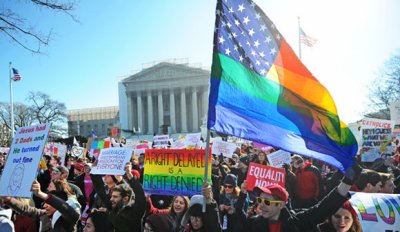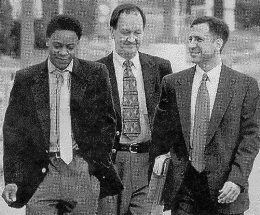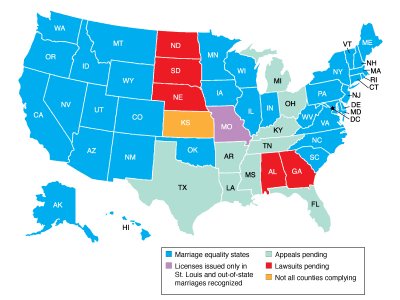|
The Court first considered the matter in the 1986 case of Bowers v Hardwick, a challenge to a Georgia law authorizing criminal penalties for persons found guilty of sodomy. Although the Georgia law applied both to heterosexual and homosexual sodomy, the Supreme Court chose to consider only the constitutionality of applying the law to homosexual sodomy. (Michael Hardwick, who sought to enjoin enforcement of the Georgia law, had been charged with sodomy after a police officer discovered him in bed with another man. Charges were later dropped.) In Bowers, the Court ruled 5 to 4 that the Due Process Clause "right of privacy" recognized in cases such Griswold and Roe does not prevent the criminalization of homosexual conduct between consenting adults. One of the five members of the majority, Justice Powell, later described his vote in the case as a mistake. (Interestingly, Powell's concurring opinion suggests that were Georgia to have imprisoned Hardwick for his conduct, that might be cruel and unusual punishment.) In 1999, the Georgia Supreme Court struck down the statute first challenged in Bowers as a violation of the Georgia Constitution. In 1996, the Supreme Court again considered gay rights issues in Romer v Evans, a challenge to a provision in the Colorado Constitution (adopted by a 54% to 46% vote) that prohibited the state or its subdivisions from adopting any laws that gave preferred or protected status to homosexuals. (The provision, Amendment 2, effectively repealed anti-discrimination laws in Boulder, Aspen, and Denver.) By a 6 to 3 vote, the Court found the Colorado provision to lack a rational basis, and therefore to violate the equal protection rights of homosexuals. Justice Kennedy's opinion concluded Amendment 2 was "born of animosity" toward gays. Justice Scalia, in his dissent, accused the Court of "taking sides in the culture wars." After Romer, speculation about the future of Bowers became widespread, with people such as Laurence Tribe predicting that Bowers "is not long for this world." Boy Scouts of America v Dale is analyzed on the "Right Not to Associate Page." The basis for the Court's decision that the Boys Scouts have a right to exclude gays was the First Amendment's implied recognition of the right of an expressive organization to exlude members who might undermine the group's goals or expressive purposes. The
Supreme Court in 2003 considered a challenge to a
Texas law that criminalized homosexual sodomy, but
not heterosexual sodomy. The case, Lawrence
v Texas, raised both substantive due
process and equal protection issues. Voting
5 to 4, the Court overruled its earlier decision
in Bowers v Hardwick and found that the
state lacked a legitimate interest in regulating
the private sexual conduct of consenting
adults. Justice O'Connor added a sixth vote
to overturn the conviction, but rested her
decision solely on the Equal Protection
Clause. Predictably, Justice Scalia
dissented, accusing the majority of "largely
signing on to the so-called homosexual agenda." As of
2013, twelve states recognize same sex marriage
(see map). In several states, the state
supreme courts (Massachusetts, Iowa, and
Connecticut) found bans on same-sex marriage to
violate state constitutions and in other states,
legislatures moved to allow same-sex
marriages. In California, where the state
legislature legalized same sex marriage only to
have the voters overturn that law by initiative
(Amendment 8), a federal district court found
Amendment 8 to violate federal equal protection
principles and the state chose not to
appeal. In 2013, the Supreme Court in Hollingsworth
v Perry dismissed an appeal by proponents of
Amendment 8 for lack of standing, a decision which
effectively will open the doors to gay marriage in
California.  Edith Windsor (right) and her spouse, Thea Spyer In
2013, in United States v Windsor, the
Court invalidated a provision of the Defense of
Marriage Act (DOMA) on the grounds that it
violated the equal protection principles embodied
in the Due Process Clause of the Fifth
Amendment. In a 5 to 4 decision by Justice
Kennedy, the Court said "careful consideration"
had to be given to "discriminations of unusual
character." That, coupled with the deference
that the federal government owes states with
respect to how they define marriage, led to
striking down the federal law that did not
recognize same-sex marriage for federal purposes
(e.g, joint filing of a tax return) even when a
couple was lawfully married under state law.
In dissent, Scalia suggested that the decision
would soon lead to another declaring state bans on
same-sex marriage unconstitutional, and argued the
matter was better left to the states to decide.  In 2015, facing a circuit split, the Supreme Court resolved the question of whether state bans on gay marriage violated the Equal Protection and.or Due Process Clause of the 14th Amendment. In Obergefell v Hodges, a five-member Court majority concluded that the bans did indeed violate both 14 Amendment provisions. Writing for the Court, Justice Kennedy said the Framers of the Constitution "did not presume to know the extent of freedom in all of its dimensions, and so they entrusted future generations a charter protecting the right of all persons to enjoy liberty as me we learn its meaning." With "new insights" into liberty's meaning, "The Court now holds that same sex couples may exercise the fundamental right to marry." In dissent, Chief Justice Roberts argued the "Constitution had nothing to do" with the right granted by the Court which, in his opinion, was making a decision left by the Framers to legislatures. Justice Scalia ridiculed the reasoning of the Court, indicating in a footnote that he would hold his head "in a bag" if he were compelled to join the majority's opinion.
|
Bowers v. Hardwick (1986) Romer v. Evans (1996) Boy Scouts of America v. Dale (2000) Lawrence v Texas (2003) United States v Windsor (2013) Obergefell v Hodges (2015) Map
Questions 2. Would the Court have recognized a right of a married couple to engage in sodomy? 3. Given the nature of the act in question, the enforcement rate of laws prohibiting sodomy will be very low. Does that mean Bowers has gotten more attention than it deserves? Why or why not? 4. If the Constitution does protect privacy, shouldn't it protect--if anything--consensual sex in a private home, raising as it does both issues of decisional and spatial privacy? 5. The Court in Bowers seemed very concerned about the slippery slope. Could the Court protect homosexual sodomy between consenting adults without also protecting polygamy, adultery, incest, or bestiality? What about sodomy in a public restroom? How might lines be drawn? 6. What is the state interest in preventing sodomy? How strong do you think it is? Does concern about sexually transmitted disease have a place in the Court's analysis? 7. Should homosexuals be treated as a suspect or quasi-suspect class for purposes of equal protection analysis? 8. Is "Don't Ask, Don't Tell" constitutional? 9. In Romer, is it reasonable to interpret Amendment 2 as leaving no recourse against a police department that adopted a policy of not investigating incidents of gay-bashing? 10. Does the interest in protecting landlords with fundamentalist beliefs, who might find it religiously objectionable to rent to homosexuals, provide a rational basis for Amendment 2? Why or why not? 11. Does Lawrence suggest that laws prohibiting homosexual marriage are unconstitutional? What legitimate interest does the state have, if any, in prohibiting two persons of the same sex from entering into a marriage relationship? 12. Justice Scalia strongly criticized the majority's reliance, in Lawrence, on European decisions affording legal protection to homosexuals engaging in private sexual conduct. Do what extend to you see decisions and trends in other parts of the world as being relevant to interpretation of our Constitution? .  Tyron Garner (left) and John Lawrence (center) were arrested when having sex in Lawrence's Houston apartment. They are pictured with their lawyer in 1998. (AP photo). Related Links
|

